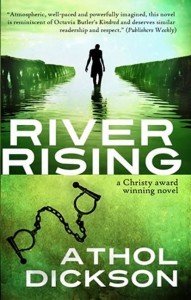"Here’s a post that I found very interesting by my friend Tim George. It opens up a lot of questions about the nature of insanity. That’s a topic I’ve wanted to write about for years, and I have tried, with two completed but unsuccessful novels to show for it. The problem is, I wanted to explore what’s happening inside an insane mind, but to reveal a person’s thoughts in a novel the first person point of view is usually required, yet first person from an insane point of view is nearly impossible for a reader to understand or follow. After all, If one could fully understand a crazy person’s thoughts, that would mean one was also crazy.
"Dostoevsky learned this too, when he wrote Crime and Punishment, which was originally written in first person. It was a total failure, so unsuccessful that he burned it. Then he converted it to third person, and of course it became one of the great classics. Maybe some day I’ll do the same thing and resurrect those two unsuccessful novels in a different format. Even so, insanity is a very difficult topic for a novel, but in this post Tim has offered us a fascinating glimpse into the fact that madness doesn’t always look like what most of us expect. Enjoy!"
_______________________________________
In The Professor and the Madman, author Simon Winchester tells an amazing tale of two men born worlds apart but brought together by their common love for words. One was an uneducated bank clerk whose love for words eventually made him the driving force of the seminal reference work for the English language. The other was a highly educated Civil War Surgeon whose descent into madness left him with little else but his love of reading and one outlet to share that love with the world beyond his asylum’s walls.
James Murray – Professor and Editor
Born in 1837, James Murray was the oldest son of a tailor whose formal education went no farther than his 14th birthday. In spite of this, by the age of 20 he was headmaster of a village school. School was soon left behind as he had to move to London for his sick wife. In spite of this, he never lost his thirst for learning. Though he worked as a bank clerk Murray became somewhat of an expert on the English language. Self taught, he was proficient in a number of languages and soon was lecturing on various literary and philosophical topics. It was in these circles that the bank teller who never went to college came to be recognized by men with Oxford credentials as the logical choice for the monumental project they had in mind. So on April 26, 1878, James Murray was tasked with overseeing a project that would outlive him many years over – The Oxford English Dictionary.
 William Chester Minor – Wordsmith and Madman
William Chester Minor – Wordsmith and Madman
Unlike James Murray, Minor was Yale educated and became a doctor. Raised by his missionary parents in what is now Sri Lanka, Minor was beset by inner demons he managed to somehow keep under control throughout his teenage years and medical school.
It was only when he entered the Union Army half way through the Civil War that the demons finally broke their chains. North and South had been at war 800 days when William Chester joined the Union Army. A few months later he found himself a surgeon during the Battle of the Wilderness, America’s first and only experience with systematic destruction. Weary of war, General Grant abandoned age old methods of prisoner exchanges and sanctioned Sherman’s “March to the Sea”. This was war on a scale and with results neither side had ever seen before.
The horrors William Minor saw left him a broken man. His paranoia and obvious mental instability eventually caused him to be discharged from the Army after which he traveled abroad in the hope that he would find a cure. Sadly, his anticipated cure never materialized. Instead he murdered a man in a fit of paranoia, thinking that someone was trying to break into his room to murder him. Before long he was sentenced to an institution for the criminally insane which would be his home for many years to follow.
The Professor and the Madman
When work on the Oxford English Dictionary began, advertisements were placed in various periodicals for readers everywhere to submit entries for the work. The idea was not to just give a definition of the word but rather to also add uses of the word in literature and common language. One applicant that ultimately caught James Murray’s attention was a Mr. Minor from the countryside of England.
For seven years Mr. Minor contributed thousands of entries for the new Oxford English Dictionary – more entries by far than any other person on the planet. So many entries that 17 years later, James Murray decided it was time he met this most scholarly and dedicated wordsmith. But William Minor offered one excuse after another for not coming to London. Finally, James Murray took it on himself to go to the man who would not come to him.
The meeting that followed must have been one to remember for both men. For 17 years James Murray had received entries for the seminal work of the English language. He assumed they came from an elusive elderly scholar who loved his books too much to travel to London. Instead he found a man who had gone through years of cycles of brilliance and madness so intense, hope for a cure had been lost.
The professor and the madman had finally met.


